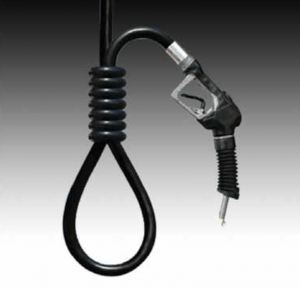The Age of Energy Scarcity
A Brave New World
A Discussion with Jeff Rubin, author of Why Your World Is About To Get A Whole Lot Smaller
By Jeff Fritz
Design by Andrea Barros
(First published in the Arbitrage Magazine Issue 3)
There is an assumption many on this Earth share, one that says the world revolves around money. It doesn’t. It revolves around oil. Cheap oil. And without it, the gears that run this current, globalized economy will come screeching to a halt.
Over the last few decades, ever since M. King Hubbert made his seminal 1956 speech to a gathering of the Petroleum Association of America, in San Antonio, there have been some who have warned about a period in the future when the demand for petroleum will outpace supply, i.e. when we need more oil than we can produce. Unfortunately, today’s experts predict that future is soon upon us.
And that future has a name: Peak Oil.
While our politicians shy away from discussing it and much of the mainstream media still barely cover it, Peak Oil remains a reality. For the facts are: oil is a finite resource (i.e. it won’t last forever). The number of new oil field discoveries have consistently gone down every year for the past three decades. And many geological reports are beginning to indicate a steady decline in the absolute quantity of petroleum being produced from the world’s largest oil producing states.
Altogether, many geologists and former oil industry employees are predicting that within the next decade, production of oil will peak and oil shortages will begin to become commonplace. This will have serious social and economic repercussions and one that will need legislative and technologically innovative measures to overcome it.
Sizing Up the Issue
To get a sense of how important cheap oil is, how ingrained it is in every aspect of our society, let’s take a look back to the waning months of 2008. While much of the world was rapt up in the drama of whether Obama was going to win the primary, much of the world was also rapt with worry over the price of gas (by July, 2008, it sat at $147 a barrel). In some places, it got to the point where talking about oil became like talking about the weather. What you did, how you lived, more and more began to depend on how high up the price of gas rose.
And with good reason.
For those living in suburbia, some had to make the choice of going to work or staying home, since the cost of commuting became unaffordable. This triple-digit rise in gas prices led to less money in people’s pockets, meaning less money to spend on everyday goods—thereby hurting businesses, causing layoffs and ultimately bankruptcies. We saw this drawn out most in the crippling of the auto industry and similarly, to the airlines.
This dip in consumer spending wouldn’t have been so bad were it not for the rabid inflation that accompanied this spike in oil prices. In the US, the headline consumer price inflation rate rose from around two per cent to almost six. But why would this be so? How is the price of oil tied into the price of food and other everyday goods?
The answer is that modern food production is based upon using petroleum based pesticides and fertilizers; thus, rising fuel costs mean rising food prices. The answer is that modern globalization is largely based upon shipping goods from countries where the cost of labour is low to countries where the consumers are rich; thus, when oil prices rise, so too the shipping costs involved and so too will the prices of goods reflect that.
Behind the Obvious
But over the past year, there has been somebody who has taken these links one step farther. Jeff Rubin, the former Chief Economist for the CIBC and recent author of the bestselling book, Why Your World Is About To Get A Whole Lot Smaller, in a phone interview with the Arbitrage, made sure to point out that “we have mistaken this recession as a financial market crisis, when in fact it was an energy shock.”
His assertion is that as oil prices rose in the latter months of 2008, pushing inflation to ever-greater heights, it forced the US Federal Reserve Board to increase interest rates to stem that rise. Unfortunately, that meant homeowners with high or fluctuating (subprime) mortgage rates saw their monthly mortgage payments shoot through the roof and, for those who couldn’t afford to pay, that meant they were out of a home. Repeat this effect for a few million homeowners across America and the result was the implosion of the financial markets, the threat of a second Depression and the subsequent bailout of banks and other financial institutions across the world.
The Hook
This was but one of the insights Rubin shared during our conversation. And it is one that he also outlines more thoroughly in his bestselling book, of which much of the introductory content above was drawn from.
But what is it about the issue of Peak Oil, or energy scarcity that attracted his attention so. Why this above all other issues in this world, such as global poverty or climate change?
As Rubin explains, “I guess it happened 10 years ago. I read this obscure book called, The Coming Oil Crisis, by Dr. Colin Cambell, who as a retired geologist that worked for a number of major oil companies in his lifetime. Basically, he talked [oil] depletion.
“I thought he brought forth a pretty compelling case. That net, we were running faster to stand still (i.e. using more oil to maintain our current standard of living).
“That’s what sort of got me going. I’m not a geologist, but by applying their research to my field [economics], it did get me thinking of some of the economic implications of Peak Oil or depletion.
Rubin explained further that, “from the economist’s perspective, the supply of oil is really a function of price. For example; when world prices of oil are $20 a barrel, the 165 billion barrels of oil trapped in the Tar Sands of Alberta isn’t really an economic resource, since converting tar sands into oil would cost about four times as much as what the market is offering. It may exist geologically, but for all intents and purposes, it’s not a economically viable resource.
“But in a world of $80 a barrel, all of a sudden you’re producing 1 million barrels [of oil] a day out of there. And in a world of $200, we could see (that rise to) 3-4 million barrels … .
“But the paradox of higher energy prices, is that we can’t afford to consume the new supply that it brings. The same [oil] prices that will lift 4 million barrels a day of production out of the Canadian tar sands for example, will translate into retail gasoline prices that will take millions of drivers of the road.”
“(On the whole, that’s what) I’m more interested in: what the economic response to this will be, how will a rational price based economy respond to these kinds of energy prices when this is the one commodity that the whole global economy runs on.”

































Share the post "The Age of Energy Scarcity"